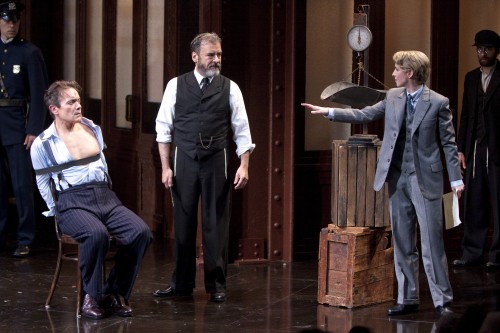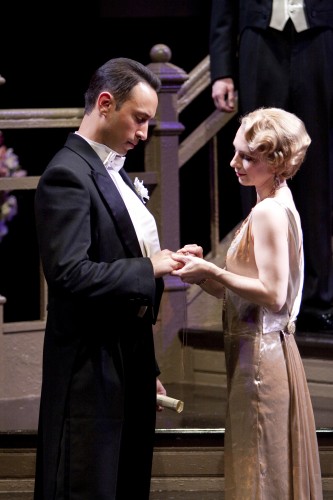
Derek Smith as Antonio, Mark Nelson as Shylock and Julia Coffey as Portia in the Shakespeare Theatre Company’s production of The Merchant of Venice, directed by Ethan McSweeny. Photo by Scott Suchman.
We come to a performance of The Merchant of Venice with a lot of preconceptions. One of them has to do with the title itself. It doesn’t refer to its most famous character, I remember a brilliant English professor beating into my brain. “Shylock isn’t the merchant,” he said repeatedly, “Antonio is.”
Antonio? Wait, who? That confusion wasn’t resolved by many productions I’ve seen, where either played as a straight villain or as a decent man tortured by institutional prejudice, Shylock reigned as the central focus. But as seductive as he is, especially to the modern sensibility that wants so badly to reconcile the beauty and insight of Shakespeare with the cruel racism inherent in many lines, protagonist he isn’t.
One of the chief joys of director Ethan McSweeny’s sprawling production now playing at the Shakespeare Theatre Company is the restoration of Antonio as the merchant of Venice. Derek Smith’s economical portrayal, containing the character’s melancholy and self-loathing within the cool veneer of commerce and charisma, is revelatory. And it’s made possible in large part by the risk of placing the action in a Venice that resembles 1920’s New York City, so that the merchants sip espresso after espresso like Little Italy denizens and the Rialto Bridge becomes a magnificent staircase suggesting a subway overpass.
By setting the action here, somehow it becomes more Venetian – the bustle of business, the hint of corruption, the glamorous sheen that barely hides a seedy decay. Sweeney nails the big picture, but gives equal weight to the quiet moments. There’s so much rich interplay in this production it’s hard to know where to look. Not all of it is perfectly realized, but there’s much to admire.

Drew Cortese as Bassanio and Julia Coffey as Portia in the Shakespeare Theatre Company’s production of The Merchant of Venice, directed by Ethan McSweeny. Photo by Scott Suchman.
In exchange after exchange, the business of the play is reinforced as, well, business. Everyone is wheeling and dealing to get something – money, position, respect. Like the staircase dominating designer Andrew Lieberman’s magnificent set, the rise and fall of fortune is paramount to the play. Bassanio (Drew Cortese) needs money to woo heiress Portia (Julia Coffey) – not just for love, but the promise of her wealth. He borrows it off his friend Antonio, who borrows it off of Jewish moneylender Shylock (Mark Nelson), the promise of his ships literally coming in as surety. Clownish servant Launcelot Gobbo (Daniel Pearce) leaves his master Shylock for the promise of greater wages and status with Bassanio. Lorenzo (Matthew Carlson) steals away Shylock’s daughter Jessica (Amelia Pedlow) not just for love but the promise of money she steals from her father.
Given all this, I sometimes wonder if there’s anyone truly likable in this play! But McSweeny shows us just enough of the truth, the baseline of securities and exchange, without overwhelming us with its elemental crassness. For all their inherent flaws, each character is allowed the possibility of redemption. The action is rich with moments that show us very simply what everyone needs to overcome – even golden Portia, usually played without reproach as wise beyond her experience, here starts off as a charming but spoiled heiress (watch how Coffey archly changes her clothes in her first scene, a fascinating choice that sharply delineates her sense of entitlement).
The two richest moments for me did include Shylock, and his first scene with Antonio and Bassanio as they hash out the details of the bond which may prove to be the merchant’s undoing is perfect, almost a jewel of economical acting. As Antonio and Shylock sit at a cafe table, the mundane setting masks the menace beneath. All is cordial civility while underneath is a loathing that cannot be overcome. They bob and weave in a dance of distaste, revealing to us the extent of their hatred without being bombastic. It’s brilliant to watch, as Nelson seems to offer a reconciliation that falls flat in the wake of Smith’s disdain. Each man’s flaws are exposed in a painful duet.
The second exposure of the soul beneath that touched me most was Shylock’s reaction to friend Tubal’s recounting of Jessica’s betrayal, the selling of her mother’s ring to gain a monkey. Nelson’s anguish is so simple yet searing it reminds one that these are lines most potent in Shakespeare, the prose that goes right to the heart of it – “I had it of Leah when I was a bachelor. I would not have given it for a wilderness of monkeys.” There are things one does not part with for gain, and here McSweeny punctuates the humanity of Shylock. Later we are reminded not all men would do the same, as Bassanio gives away Portia’s ring.
What is the true worth of his love, and what future will they have together? Though The Merchant of Venice is a comedy, ending classically with a double wedding, there is loss at the end. Antonio is alone, vowing to uphold his friend’s fidelity to his wife, but she saw those excessive tears at the trial. McSweeny chooses to end not with this image as many others have done, but with Jessica having a vision of her father as she holds the forced gift of his deed. The possibility of redemption? Or a warning? It’s unclear, which I don’t mind, as ambiguity is the nature of this play and the reason we keep coming back to it.
This is just a sampling of the intricate moments. The only one that rang false to me I have to assume will be ironed out during the run – Lorenzo and Jessica’s final scene together was in dire need of intention, focus and better pacing. As always the STC’s set and costumes are spectacular, and Marcus Doshi’s lighting design gives them an even greater depth. However, Steven Cahill’s sound design seemed far too Broadway musical to match the rest of the complexity on display. But it’s a minor quibble when there’s so much to delve into with this production. It’s that rich with life.
Shakespeare Theatre Company‘s production of The Merchant of Venice plays at Sidney Harman Hall through July 24. Located at 610 F Street NW, Washington, DC. Closest Metro stop: Gallery Place/Chinatown (Red/Green/Yellow lines). For tickets call 202-547-1122.

